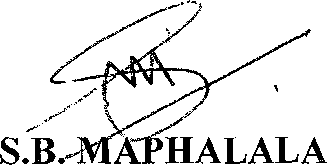HIGH COURT OF SWAZILAND
Held at Mbabane
Boy Mashiyadla Mdluli
Applicant
vs
Commissioner of Police & 3 Others
Respondent
Civil Case No.3620/2009
Coram
For Applicant For Respondent
MAPHALALA PJ MR. S. PHIPJ MR. V. KUNENE
JUDGMENT 27th OCTOBER 2009
[1] On 13 October 2009 the Applicant filed an urgent application for an order in the following terms:
"1. That the rules of the above Honourable Court in respect of manner of service, form and time limits be dispersed with and this matter be heard as one of urgency;
Condoning the non-compliance with the rules regarding the manner of service, form and time limits.
That the Respondents be and are hereby directed jointly and/or severally to release the motor vehicle which is the subject matter of this application to the Applicant forthwith;
Costs of suit."
[2] The application is founded on the affidavit of the Applicant who has outlined the material facts in this case.
[3] The Respondents oppose the orders sought by the Applicant and have filed a Notice of intention to raise points of law. I must also add that one other point in limine was raised from the bar to the effect that Applicant has not exhausted local remedies to be granted an interdict.
[4] The other two points raised in the Notice are firstly that Applicant failed to comply with the requirements of Rule 6(25) (b) of the High Court Rules. Secondly, that the urgency is self created.
[5] I have listened to interesting arguments of Counsel on all these points and my view of the matter is that the Applicant has satisfied the requirements of Rule 6(25) (b) as the founding affidavit of the Applicant is clear in this regard. From paragraphs 13 to 14.4 allegations are made to satisfy the full rigours of the Rule and I have no doubt in my mind that urgency has been proved in this case. The point that the urgency is self created is also not correct on the facts of the matter.
[6] The only point against the Applicant is the one raised by the Respondent when arguing the requirements of an interdict that the Applicant has not exhausted local remedies. That he was entitled in law to approach the Magistrate Court to have this motor vehicle released to him.
[7] Counsel for the Applicant argued that the High Court in exercise of its inherent jurisdiction has power to grant this application. That the local remedies in the Magistrate court were not adequate.
[8] According to the learned author's Herbstein et al The Civil Practice of the Supreme Court of South Africa, 4th Edition at page 1074:
"the applicant for an interdict must establish that there is no other adequate remedy available to him. In some case, however, it has been held that this is one of the factors that should be taken into account by the court in exercising its discretion as to whether to grant an interdict. Clearly, the absence of an adequate alternative remedy cannot be both an essential of its discretion. It must be one or other. The authors of Jones & Buckle indicate that the requirement is a fact which must be established on a 1 balance of probabilities when the claim is for a final interdict and a fact relevant to the exercise of the court's discretion when the claim is for an interim interdict. Not all of the cases cited, however, support the drawing of a distinction on this basis. In our view, this is not the type of fact that it is appropriate to require a party to establish on a balance of probabilities, and it would be preferable if it were to be regarded as a factor to be taken into account by the court in the exercise of its discretion for the purpose of both final and interim interdicts. Thus, in Candid Electronics (Pty) Ltd v Merchandise Buying Merchandise (Pty) Ltd Cooper J said that "the grant or refusal of an interdict is a matter within the discretion of the court hearing the application and depends on the facts peculiar to each individual case and the right the applicant is seeking to enforce or protect', and added that the 'rule' that an interdict may not be granted when the applicant can obtain 'an impermissible curtailment of the court's discretion'. It had, in any event, always been recognised that an interdict would be granted if, inter alia, the applicant would otherwise be compelled to part with his rights."
[9] On the facts of the present case it appears to me that the Applicant has failed to exhaust local remedies available to him. The approach to the Magistrate is less costly and is done as a matter of course in the Magistrates' Courts.
[10] I find what is stated by the Applicant at paragraph 15.4 of his founding affidavit that Applicant had no other remedy to be untrue on the facts of the case.
[11] The wisdom of approaching the Magistrate's Court as a first port of call cannot be gainsaid as the motor vehicle which is an exhibit in the criminal case before that Court can be released to the complainant on suitable conditions. In the event the Magistrate's Court declines to release the motor vehicle the Applicant can then approach this Court on review of that decision of the court aquo.
[12] It would be dangerous to release the exhibit before the Magistrate Court at this stage as this might interfere with the criminal prosecution before that Court.


[13] In the result, for the aforegoing reasons the application is dismissed with costs.
1